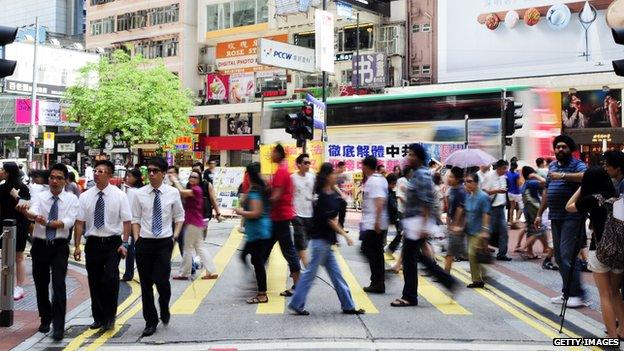Hopeful in Hong Kong
- Published

Hong Kong is a magnet for students from around the world
The prospects of a fast track onto the career ladder is drawing students from around the world to Hong Kong, but the path to riches is not an easy one.
Only those who can afford to make the trip and pay for studies are able to make the move and on top of that they will have to learn at least one language if they want to get on.
"Ta shi na guo ren," the earnest Mandarin Chinese teacher, Ms Zhang, intones.
A chorus of voices mimics her, straining to match the instructor in pronunciation and pitch, in order to ask the question: "What country is he from?"
It is a weekday afternoon at the leafy campus of the University of Hong Kong (HKU), located in the hills west of the city centre.
About two dozen students from Europe, the United States and South Asia are taking an introductory class in Mandarin Chinese.
The course is so popular among international students that Sean Quinn, a second-year student originally from Britain, almost did not get a place.
The 20-year-old is one of 300 overseas students that HKU accepts every year for its undergraduate degree programme, where courses are taught and examined in English.
The son of an international banker, Sean had lived in America, and considered attending university there or at home in the United Kingdom.
But he chose to head east to Hong Kong, in order to be with his family and escape from what he calls a dismal post-graduation job search back home.
"Well, what I would face in the UK after graduation would be just a wall of rejections," he admits, with a rueful chuckle.
"It is very difficult to find paid work. It's even difficult to find unpaid work in the UK. I know this from friends who have graduated and remain jobless for a year after graduation in some cases," he tells BBC News while taking a break in a study room.
Going east
The perception that booming economies in the East currently offer more job opportunities than in the West explains why increasing numbers of overseas students are clamouring to study in Asia, particularly at Chinese universities in Hong Kong, Beijing and Shanghai.
The trend is especially visible in the university district of north-western Beijing, where students of many different nationalities congregate for classes.
At HKU, which started enrolling international students in 2005, applications for degree programmes were modest at first, but started soaring by more than 20% after the global financial crisis of 2008.
While not completely untouched, Asian economies have weathered the economic crisis relatively well.
"Without a doubt, students are understanding that they need to look long-term, as well as short-term," John Spinks, the university's director of undergraduate admissions, tells BBC News.
"That medium term is all about careers and career advancement," he says. "The reality is that at this moment in time, when you look at 2012, the employment rate is very high. The graduate employment rate is even higher, especially when you look at this university."
Mr Spinks says the unemployment rate for HKU's fresh graduates stands at 0.2%.
That compares with a jobless rate of 3.4% for Hong Kong in 2011, which is already considered by economists to be equivalent to full employment.
Asia's growing economic might is helping to change global patterns in student mobility, according to the United Nations Educational, Scientific and Cultural Organization (Unesco).
As a result of more stringent visa policies and a relatively less-dynamic economy, the proportion of mobile students going to the US fell from 32% in 1998 to 19% in 2008, according to Mr Spinks, citing figures from Unesco.
At the same time, the proportion of US students coming to Asia grew from 6% in 1998 to 11% in 2008.
Locals versus expats
Many of those students aim to learn an Asian language.
Sean Quinn had debated between studying Cantonese, the dialect spoken in Hong Kong and south China, or Mandarin, the national dialect.
He eventually chose Mandarin because it is used more widely and may open more professional doors.
That is a wise move, according to recruiters.
Because multi-national firms are getting more of their business from the fast-growing Asian markets, they increasingly prioritise employees with deep local knowledge and connections.
The days when a Western expatriate was able to land a job with few qualifications besides English language fluency are over, says Angel Lam, a Hong Kong-based recruiter at the Robert Walters agency.
"Language skills are very important. The ability to understand the local culture is very important, so if you don't have the language skills and you haven't been to a specific Asian country, then getting a job will be a challenge," she warns overly optimistic expats.
Her agency estimates the number of inquiries from Western expats who want to work in the Asia Pacific region has jumped by more than 30% over the past four years.
Not all will find what they are looking for.
Ms Lam says the jobseekers she finds easiest to place are so-called returnees, people born and bred in Asia but educated abroad.
These candidates are often fluent in English, as well as one or more Asian languages.
She says they have an instinctive grasp of their native culture, adapt well and are often cheaper to hire than a Western expat because they do not require relocation packages.
Recruiters say Western candidates can be competitive if they speak Asian languages or have specialist knowledge.
Sean Quinn understands the importance of immersing himself in the local culture and language.
He has not entirely decided whether he will seek further education or join the workforce after graduation, but he feels moving to Hong Kong was one of the best decisions he has ever made.